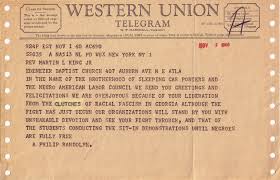记忆方法
1、tele- "far" + gram- "graph-".
2、字面含义为:that which writes at a distance.
2、字面含义为:that which writes at a distance.
中文词源
telegram 电报
tele-,远的,-gram,写,记录,衍生自-graph.引申词义电报。
英语词源
- telegram (n.)
- "telegraphic dispatch," according to Bartlett's 1859 edition a coinage of E. Peshine Smith of Rochester, N.Y., from tele-, as in telegraph + -gram, and introduced in the Albany "Evening Journal" of April 6, 1852. Damned in the cradle by purists who pointed out that the correct formation would be telegrapheme (which is close to the Modern Greek word).
May I suggest to such as are not contented with 'Telegraphic Dispatch' the rightly constructed word 'telegrapheme'? I do not want it, but ... I protest against such a barbarism as 'telegram.' [Richard Shilleto, Cambridge Greek scholar, in the London "Times," Oct. 15, 1857]
Related: Telegrammic.
权威例句
- 1. "I want to send a telegram." — "Fine, to whom?"
- “我想发份电报。”——“好的,发给谁?”
- 2. A few days earlier he had received a telegram from Lord Lloyd.
- 几天前,他收到劳埃德勋爵发来的一封电报。
- 3. The victory inspired him to dispatch a gleeful telegram to Roosevelt.
- 胜利促使他给罗斯福发了封喜报。
- 4. A telegram from Uncle Fred arrived.
- 弗雷德舅舅发的一封电报来了。
- 5. The President received a briefing by telegram.
- 总统收到用电报发来的一份简报。

